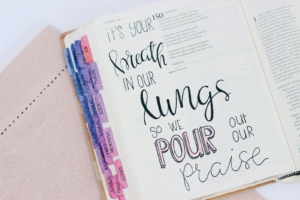Panic attacks can come on suddenly. They can be debilitating and affect every aspect of your life. This feeling of panic may cause you to stop acting normally if you have frequent panic attacks.
Panic attacks can be as minor as feeling sick to your stomach to as severe as feeling like you’re having a heart attack. Although medication might be the correct route for some patients, there are alternatives.
Five tips for dealing with a panic attack
 Here are five ways to calm yourself down during a panic attack:
Here are five ways to calm yourself down during a panic attack:
Get a wet washcloth
Your body will respond to the awakening of the senses, especially that of touch. If you’re feeling yourself begin to panic, go to the nearest bathroom and wet a paper towel with cold water. Place it on the back of your neck and wipe your neck down. The shock to the senses might help take your mind off your panic and help your body cool down.
The touch of the water will help bring a new sensation that the brain must process, allowing the brain to take the focus off the source of the panic. As your body cools down, your body temperature and heart rate will also lower. Keep the wet washcloth around your neck; you can also do this at work or during your drive home.
Sit in a dark room
During a panic attack, your senses are heightened and overly stimulated. To calm yourself down and allow your brain to recalibrate from all the stress it’s experiencing, get into a dark room and sit in silence. Deprive your senses of any stimulus for at least sixty minutes. Take it one step further and do some deep breathing. Focusing on your breathing will help calm your brain and distract you from whatever is causing you to panic.
Sometimes, the body will trigger cortisol levels to rise if it’s been under stress for an extended period. By reducing stimulation to the brain, it will rewire to a normal response. We can re-calibrate by encouraging the brain to not allow excessive amounts of cortisol, causing it to be overstimulated.
Focusing on deep breathing and clearing your mind of stimulation will help the senses calm down and acclimate to the darkness. This focused breathing will also help your brain to process on whatever is causing you panic. Your senses will be better once you can get the body to stop rethinking the troubled issue.
Think through worst-case scenarios
 People who struggle with anxiety are often worried about the anticipation of bad things to come. Sometimes, your brain needs to focus on and process the issue that caused the stress. Try to think through the worst-case scenario of the situation.
People who struggle with anxiety are often worried about the anticipation of bad things to come. Sometimes, your brain needs to focus on and process the issue that caused the stress. Try to think through the worst-case scenario of the situation.
For example, if you’re struggling financially, think about what it will be like if you stop paying your bills. Maybe you are worried about losing your home and your possessions. Start researching apartments that are more affordable options.
While moving into an apartment will be an adjustment, and it may take some work and some downsizing, you will not be homeless. You may lose possessions, but in the end, living in an apartment is the best bet for you to be less worried about what’s to come.
This transition is the same with relationship situations, tension at work, etc. What would it be like to lose that relationship, or job, or never speak to that co-worker again? How would your life be different? How will it be the same? By thinking through the worst thing that can happen, you can have a plan in place in case your worst fear does come true.
Wear a rubber band
Wearing a rubber band around your wrist will help in case of a panic attack. Whenever you feel panicked, simply snap the rubber band. As the band snaps against your wrist, you will feel a little sting of pain, which will help distract you from what made you panic. Anything you can do that takes your mind off what is panicking you, or grounds you in the present and refocuses your mind will help.
The longer you can keep your mind focused off the area of panic and move on to something else, the more it will help your body stay productive and lower your cortisol levels naturally. The key is to get your cortisol levels to lower naturally so that your heart rate will go down and that sense of fear will start to subside.
Journal
 Writing down your thoughts is a great way to relieve your mind. Keep your journal in a place where you can keep the contents private. Use your journal to dump any thoughts that come to your mind. Also, write down any negative thoughts. Allow your journal to be a secret place where you can tell it anything.
Writing down your thoughts is a great way to relieve your mind. Keep your journal in a place where you can keep the contents private. Use your journal to dump any thoughts that come to your mind. Also, write down any negative thoughts. Allow your journal to be a secret place where you can tell it anything.
As you write, your mind wanders. Do a stream-of-consciousness writing and allow your mind to process the situation. Start by saying “I am mad about…”. Name the fear and the feeling that you’re feeling. Eventually, you will get deep into the more profound feeling behind the fear.
If you feel like you need a break, brainstorm ways to take a break so your fear can subside. It’s essential to care for yourself, and journaling is a great way to process your emotions and thoughts and keep them private. If you’re feeling brave, throwing the journal away at the end symbolizes ridding yourself of that fear.
Do not hold on to negative thoughts and feelings after processing them. This exercise would be an attempt for you to continue to meditate on those negative thoughts. God has given us the ability to process thoughts and let things go so we can walk freely. Allow yourself to do so.
Seek help
If necessary, contact a therapist and talk to them regarding your fear. Counselors can be great sounding boards for your situation. Not only can they give you a different perspective on your circumstances, but they also give you practical strategies besides the ones listed above to help you deal with your fear.
Therapists can also provide suggestions if the panic attacks are making you miss out on important events in your life. Panic attacks can lead to agoraphobia and other major phobias if not appropriately treated. Your body’s natural cortisol levels are needed to trigger the fight-or-flight response. However, those emotions must be regulated to be used only in times of crisis.
 Medication may be necessary in some instances. There is no shame in using medication if you need help. Some medicines will help you to calm down during a panic attack. Other ones may help you sleep because the side effects of a panic attack – fatigue, dizziness, and others – may make it hard to sleep.
Medication may be necessary in some instances. There is no shame in using medication if you need help. Some medicines will help you to calm down during a panic attack. Other ones may help you sleep because the side effects of a panic attack – fatigue, dizziness, and others – may make it hard to sleep.
Be sure to use your medication as directed, under the supervision and with the direction of your primary care provider or psychologist. Panic attacks can be frightening. They can affect every area of your life and cause you to miss important events because of that fear.
However, by using some natural strategies, you can calm yourself down when a panic attack occurs. Allow your mind and body to calm so that you can live a life free of fear and process your emotions effectively so that fear will not reign over your life.
If you would like additional guidance as you manage panic attacks, contact us today. The counselors and therapists at our office are professionally trained and ready to help.
“Panic”, Courtesy of Phạm Nhật, Unsplash.com, Unsplash+ License; “Distraught”, Courtesy of Meghan Hessler, Unsplash.com, CC0 License; “Calligraphy”, Courtesy of Nienke Broeksema, Unsplash.com, CC0 License; “Letting Go of the Stress”, Courtesy of Eli DeFaria, Unsplash.com, CC0 License









